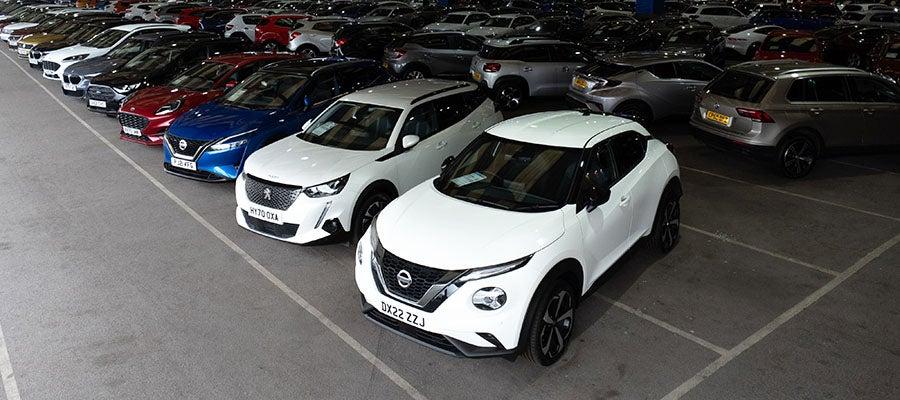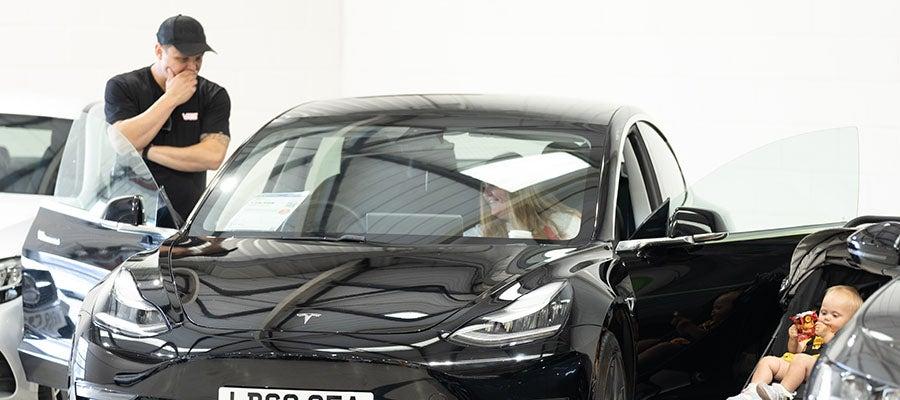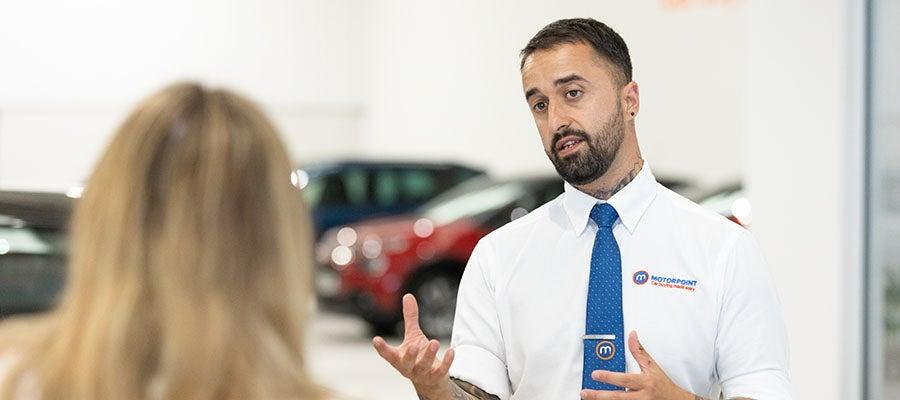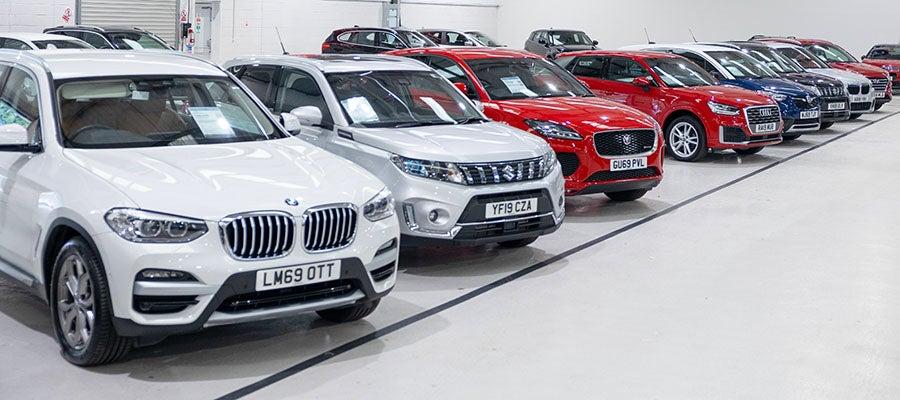Over 90% of new car buyers use Personal Contract Purchase (PCP) finance to break the cost down into manageable chunks, and it’s a popular choice for many used car buyers as well.
If the very mention of anything to do with finance makes you want to bury your head in the sand, we see you. PCP finance sounds complicated at first, so we’ll break it down to what you need to know in a simple and friendly way. Smiley face emoji.
- What is PCP car finance?
- How does PCP car finance work?
- Should I buy a car with PCP finance?
- What should I do at the end of a PCP agreement?
- When is paying the PCP balloon payment a good idea?
- When is part exchanging a PCP car a good idea?
- When is returning a PCP car a good idea?
- When should you avoid returning a PCP car?
What is PCP car finance?
Personal Contract Purchase (PCP) deals effectively involve paying the difference between what the car is worth now and what it’s expected to be worth in several years’ time. You’re not paying off the full cost of the car, which means lower monthly repayments versus the other main type of car finance, Hire Purchase (HP).
This does mean you won’t automatically own your car at the end of a PCP agreement – instead you have three options which we’ll get onto further down the page.
PCP is a good finance option if you like changing your car every few years, or if you want lower monthly repayments than an equivalent hire purchase (HP) finance package. It’s also the most flexible type of car finance, with options available if your circumstances change.
How does PCP car finance work?

PCP finance agreements usually start with a non-refundable deposit. Sometimes a certain amount is stipulated by the finance company, but usually you can choose a deposit amount that works for you. Motorpoint and many other sellers also offer no-deposit car finance, if you don’t want to put a lump sum down at the start of your agreement.
You then pay a series of monthly repayments over an agreed period, usually between two and four years. These repayments cover the amount you financed, plus any interest charged.
Then, at the end of the agreement, you have three choices. You can pay an optional final payment – also referred to as a balloon payment or as the car’s Guaranteed Future Value (GFV) – to own the car outright. Alternatively, you can hand the car back and walk away. Or, you can arrange to part exchange the car, putting any equity you’ve built up towards your next finance agreement.
When you set up PCP finance to buy a car, look out for these key details in the finance agreement to understand whether the deal is right for you:
- Deposit: most finance buyers put down a lump sum at the start of the agreement to partially pay off the balance. Generally speaking, the larger the deposit, the lower your monthly payments will be, along with reducing the amount of money you have to pay in interest
- Monthly payments: these are the regular payments you make to settle the balance of your PCP agreement. Most PCP deals are spread over three or five years. The amount will vary depending on the value of the car you choose, the deposit you put down and the rate of interest
- Duration: this is simply how long the finance deal lasts in months
- Interest rate: this percentage determines the amount of interest you pay on the finance deal. You can use this figure to compare different finance quotes to understand how competitive they are – although you won’t get the advertised interest rate if you have poor credit
- Optional final payment/balloon payment/GFV: how much the car is expected to be worth at the end of your agreement, and how much you’ll need to pay if you want to own the car outright. If you decide not to pay this figure, you’ll need to hand the car back to the finance provider at the end of your agreement or transfer to a new PCP deal on a different car. Balloon payments can be quite large so you might want to consider taking out a bank loan or refinancing it to make it more affordable.
- Total amount payable: this is the complete cost of the finance, interest and fees over the duration of the agreement. You can look at this figure in relation to the car’s list price to understand whether the PCP deal represents good value for money
- Annual mileage: you will agree an annual mileage figure with your finance provider at the start of your PCP deal. This is important because the number of miles a car’s covered influences how much it’ll be worth at the end of the agreement, with higher mileages reducing the car’s value. Make sure you set a realistic figure here because you’ll get fined at the end of your agreement for every additional mile you’ve covered beyond the stated figure
Should I buy a car with PCP finance?

PCP finance can be a good choice if you like to change your car every few years. It’s the most flexible type of car finance, both in terms of what happens at the end of the contract and if your circumstances change mid-contract.
For example, let’s say you’re young and free, and decide to finance a Fiat 500. If, a couple of years in, you start a family and decide the 500 is too small, you may be able to transfer your balance to a new PCP deal on a larger car – bearing in mind that your monthly payments will rise if you’re paying off outstanding finance on your old car.
However, it’s important to consider whether you’ll be able to afford the monthly payments for the duration of your contract – which, granted, might be hard to do unless you’ve got a crystal ball.
Most cars available on PCP are nearly new or brand new, and many will still have a balance of the original warranty remaining. As a result, you shouldn’t be stung by unexpected repair costs. Even if the car you’re considering isn’t covered by a manufacturer’s warranty, you can get extra peace of mind by taking out an extended warranty when you purchase your car.
PCP might also be a more affordable way to buy a particular car you’ve got your eye on, compared to taking out HP (hire purchase) finance, which nearly always has higher monthly payments. The difference is that, as an HP buyer, you’ll own the car at the end of your agreement but, on a PCP, you’ll need to pay the balloon payment to own the car.
What should I do at the end of a PCP finance agreement?
At the end of your PCP agreement, you have three options:
- Pay the optional final balloon payment to own the car outright
- Part exchange the car and use any equity remaining towards the cost of your next finance agreement
- Hand the car back and walk away
Keep reading to understand the pros and cons of each of these three choices.
Be aware – if you don’t discuss how you want to end your PCP agreement, the default option will see your finance provider try to charge you the optional final payment. This will likely be thousands of pounds, which you might not have immediately available. This could lead to that payment failing and a potential negative impact on your credit history.
That said, finance companies should always contact you before your agreement ends to discuss your options. If you’re within the final few months of your agreement and haven’t heard anything, however, it’s a good idea to give them a call and discuss how you’d like to end the agreement.
Read our full guide to what happens at the end of a PCP agreement here.
When is paying the PCP balloon payment a good idea?

- You want to own the car outright
- The car has more mileage than agreed, or damage that you’d be charged for
- Your car may be worth more than the balloon payment (in positive equity)
The most obvious reason for paying the optional final balloon payment is if you decide you want to own your financed car outright. In this situation, you have several options for payment – you can refinance the payment with your existing provider or with a competitor, you can put up the cash yourself if you have it available, or you could take out a bank loan to cover the amount – make sure you weigh up all options to see which is the most affordable.
You might also want to consider paying the balloon payment if you’ve gone substantially over your mileage limit, or if the car has damage that goes above fair wear and tear. In these circumstances, the finance company will fine you for excess mileage or damage if you decide to hand the car back to end the finance deal. Paying the balloon payment makes you the car’s legal owner and means finance companies won’t fine you for any mileage or damage issues. You can then opt to get any repairs done in your own time and at your own budget.
If you get to the end of your PCP agreement with your car being worth more than the final balloon payment, you could negotiate putting the difference towards your next finance deal, or you could pay the optional balloon payment to own the car outright and then immediately sell it for its higher market price. This would allow you to pocket the difference as cash to put towards whatever you like, although it does mean you have to put up with the hassle of selling your car.
When is part exchanging a PCP car a good idea?
- You want a new car or don’t want to keep your current car
- Your car is worth more than the optional final payment
- You don’t want the hassle of selling your car privately after paying the balloon
You might want to consider part exchanging your PCP car if you’d like to change vehicle at the end of your finance deal. This might be because the car you’d financed didn’t turn out to be your cup of tea, or you’d just like to try something else.
Part-exchanging a PCP car can also be a good idea if you have equity in your vehicle. This simply means that the car’s value is higher at the end of the PCP finance deal than the optional final payment.
For example, you might want to consider part exchanging your PCP car if it’s worth around £14,000 at the end of your finance deal, but the optional final payment is only £12,000. In this case, you would have £2,000 equity built up in the vehicle to put towards your next finance deal.
When is returning a PCP car a good idea?

- It is worth close-to or less than the optional final balloon payment
- You no longer want the car
- You don’t want to continue with finance payments
Returning your PCP car at the end of your finance deal might be the right option for you if you don’t want to keep the car, or are no longer able to keep up with the repayments.
You might also want to consider returning your PCP car if its value is close to or even less than the optional final balloon payment. In this situation, if you wanted to keep or part exchange the car, you would have to pay the optional final payment plus the difference between it and the car’s value. In this case, returning the car to the finance company is probably the best bet – your agreement will end and you won’t have to pay the difference between the vehicle’s value and the optional final payment.
When should you avoid returning a PCP car?
- It is worth more than the optional final balloon payment, because you can put the equity towards your next finance agreement
- You want to pay the balloon payment and own the car outright
- The car has more damage or mileage than set out in the agreement, leaving you with a big fine for repairs
It might sound obvious, but returning a car on PCP finance probably isn’t right for you if you want to keep the car, or trade it in for another financed vehicle. If your car is worth more than the optional final payment at the end of your finance deal, you can put any equity you have built up towards the cost of your next finance deal. You also have the option to pay the balloon payment to own the car and then sell it for its market value, pocketing the difference to use however you want.
Bear in mind that PCP deals include fines for any damage that exceeds fair wear and tear, or for any mileage you cover beyond what was agreed in your finance deal. If your car has picked up a few more serious battle scars in the time you’ve owned it, or if you’ve driven substantially further than the agreed mileage, it might be worth considering paying the balloon payment to own the vehicle, because you might face a substantial fine upon returning the car. If you pay the balloon payment, the finance company won’t charge you for mileage or damage because you will be the car’s owner. At that point, you can then choose to get any repairs done in your own time.
Not interested in PCP? Find out more about hire purchase finance
Hire purchase (HP) is the next most common type of car finance. Read our HP finance guide for more info, or check out the finance options Motorpoint offers across a great range of used cars.



































